

Library Juice Academy Courses. Things – 23 framework things. Annual Instruction Showcase Presentations. Per year, all presentations are listed in alphabetical order by presenter's last name.
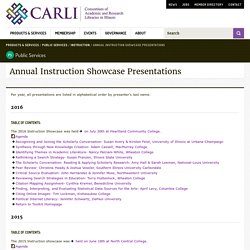
Table Of Contents: The 2015 Instruction showcase was held on June 18th at North Central College.AgendaResearch Methods Instruction- Frances Brady, Adler UniversityIdentifying Relevant Information- Samantha Crisp & Rachel Weiss, Augustana CollegeIdentifying, Analyzing, and Evaluating Primary Sources- Belinda Cheek & Kimberly Butler, North Central CollegeActive Learning Library Instruction Program (ALLI)- Bryan Clark & Jessica Bastian, Illinois Central CollegeEvaluating Sources: What is a 'Reliable' Source?
Handouts, Worksheets, & Activities for Information Literacy. Teaching & Learning Department I Services Handouts: Information on key concepts & skills Worksheets: Exercises for students Activities: In-class activities to be facilitated by an instructor Additional Resources More about information literacy.
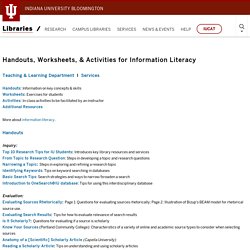
Handouts Inquiry: Top 10 Research Tips for IU Students: Introduces key library resources and services From Topic to Research Question: Steps in developing a topic and research questions Narrowing a Topic: Steps in exploring and refining a research topic Identifying Keywords: Tips on keyword searching in databases Basic Search Tips: Search strategies and ways to narrow/broaden a search Introduction to OneSearch@IU database: Tips for using this interdisciplinary database Evaluation: Evaluating Sources Rhetorically: Page 1: Questions for evaluating sources rhetorically; Page 2: Illustration of Bizup's BEAM model for rhetorical source use.
Effective research assignments - : Effective research assignments. Toolkit: Authority Is Constructed and Contextual. Overview "Information resources reflect their creators’ expertise and credibility, and are evaluated based on the information need and the context in which the information will be used.

Authority is constructed in that various communities may recognize different types of authority. It is contextual in that the information need may help to determine the level of authority required. " From Mass Higher Education to Universal Access: The American Advantage. Cognitive Load Theory and Library Research Guides. Submissions. Online Submissions Already have a Username/Password for Communications in Information Literacy?
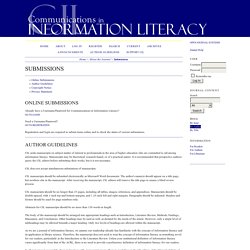
Go to Login Need a Username/Password? Go to Registration Registration and login are required to submit items online and to check the status of current submissions. Author Guidelines. Designing Significant Learning Experiences. Here are some documents with ideas and information that may be valuable to anyone trying to design their courses.
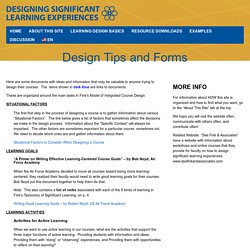
The items shown in dark blue are links to documents. These are organized around the main tasks in Fink’s Model of Integrated Course Design. The first first step in the process of designing a course is to gather information about various “Situational Factors”. The link below gives a list of factors that sometimes affect the decisions we make in the design process. Information about the “Specific Context” will always be important. Situational Factors to Consider When Designing a Course. Cindi – Canva. Seismic Shifts: The Framework for Information Literacy as an Inte. Making an IMPACT: Transforming academic courses through student c.
Contributions report. Publications in Librarianship: Guide for Authors. We are delighted that you are considering publishing with ACRL Publications in Librarianship.
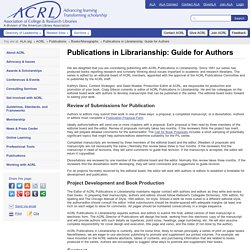
Since 1951 our series has produced books reporting research and scholarly thinking about issues important to academic and research librarians. The series is edited by an editorial board of ACRL members, appointed with the approval of the ACRL Publications Committee and is published by the ACRL staff. Kathryn Deiss, Content Strategist, and Dawn Mueller, Production Editor at ACRL, are responsible for production and promotion of your book.
Craig Gibson currently is editor of ACRL Publications in Librarianship. He and his colleagues on the editorial board work with authors to develop manuscripts that can be published in the series. Review of Submissions for Publication Authors or editors may submit their work in one of three ways: a proposal, a completed manuscript, or a dissertation. Ideally authors/editors will send one or more chapters with a proposal. Prlmpub. Prlmpub. 4977 1. Information%20Literacy%20Standards%20for%20First Year%20Students. ACRL IS ILBP%20Rubric%20Final%20March%202013. Rhem 2013 Threshold concepts. Rubric - Google Sheets. Hashtag That! by McKeldin Teaching and learning. An Error Occurred Setting Your User Cookie.
Sample Assessment Tools - USF Library Instruction Assessment Clearinghouse - LibGuides at University of South Florida Libraries. FacultyGuide. From Standards to Framework by Erin Valentino on Prezi. Sample Assignments - Information Literacy in the Core Workshop for Faculty - LibGuides at Loyola Marymount University. What we did - Building Information Literacy by Bringing the Library into the Classroom - UTEP Library Research Guides at University of Texas El Paso. During the Fall 2014 semester, we incorporated information literacy course enhancements into one section of RWS 1301 (Rhetoric & Composition I).
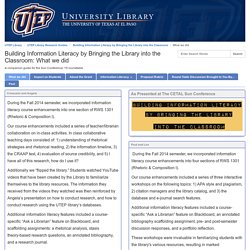
Our course enhancements included a series of teacher/librarian collaboration on in-class activities. In class collaborative teaching days consisted of: 1) understanding of rhetorical strategies and rhetorical reading, 2) the information timeline, 3) the CRAAP test, 4) evaluation of source credibility, and 5) I have all of this research, how do I use it? Additionally we “flipped the library.” Students watched YouTube videos that have been created by the Library to familiarize themselves to the library resources. The information they received from the videos they watched was then reinforced by Angela’s presentation on how to conduct research, and how to conduct research using the UTEP library’s databases. As a result of our collaboration, information literacy was not a concern, nor an issue, within students’ drafts. Home - Introduction to Library Research - LibGuides at Indiana University-Purdue University Indianapolis.
Home - Bridge 2015 - LibGuides at Indiana University-Purdue University Indianapolis. Begin Research - Start Your Research Tutorial - LibGuides at Indiana University-Purdue University Indianapolis. Lily’s assignment is broad enough to give her some choices when picking a topic.
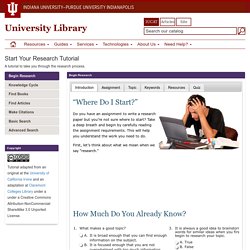
So, what makes a good topic? Beyond the Threshold: Conformity, Resistance, and the ACRL Information Literacy Framework for Higher Education. Throwback Thursday for July 16, 2015: In the Library with the Lead Pipe welcomes Ian Beilin to our Editorial Board!
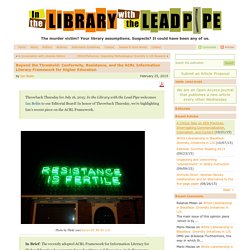
In honor of Throwback Thursday, we’re highlighting Ian’s recent piece on the ACRL Framework. In Brief: The recently adopted ACRL Framework for Information Literacy for Higher Education has generated much critique and discussion, including many important reflections on the nature of information literacy and librarianship itself. This article provides a brief consideration of some of these responses and as well a critique of the Framework from the perspective of critical information literacy. Toolkit: Authority Is Constructed and Contextual. Beyond the Threshold: Conformity, Resistance, and the ACRL Information Literacy Framework for Higher Education. The problem with threshold concepts. Over the past four months, an ACRL task force dedicated to rewriting the Information Literacy standards has been releasing successive draft versions of a new Framework for Information Literacy in Higher Education.
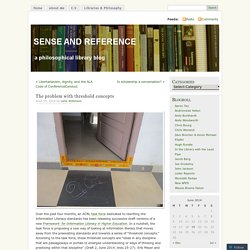
In a nutshell, the task force is proposing a new way of looking at information literacy that moves away from the preexisting standards and towards a series of “threshold concepts.” According to the task force, these threshold concepts are “ideas in any discipline that are passageways or portals to enlarged understanding or ways of thinking and practicing within that discipline” (Draft 2, June 2014, lines 25-27). Erik Meyer and Ray Land, who developed the theory of threshold concepts, explain that “a threshold concept is likely to be The six transformative, irreversible, integrative, bounded, troublesome concepts identified by the ACRL task force are as follows: You really ought to read the draft, then come back.
#acrlilrevisions Next Steps. It seems like we are almost at the final version of the ACRL Framework revisions. I submitted my feedback a couple weeks ago through the ACRL Student Learning & Information Literacy committee that I'm on (we are sending it collectively) and feel for the most part that I have a decent grasp on how we might use these at the University of Arizona. Even though it's not finalized yet, we've been needing to work with the draft as is for projects here, such as badging, programmatic instruction, and constructing our department's IL plan and philosophy not too long after we had a restructuring. I'm helping coordinate our plans for programmatic instruction here so I keep thinking and re-thinking about these frames.
When designing instruction, I like to come up with "big questions" or "understandings," as Wiggins and McTighe refer to. Below is our draft thus far. Frame: Authority Is Constructed and Contextual - Framework for Information Literacy for Higher Education - LibGuides at PALNI consortium. Authority is Constructed and Contextual - Research 101 - Research Guides at University of Washington Libraries. Welcome to Research 101: Credibility is Contextual The credibility or trustworthiness of an information source depends on where it came from, who it was made for, and how you use it--we call this the the context.
Effective researchers understand that the level of credibility and quality needed from a source will vary based on the context. Researchers use many different benchmarks or criteria to evaluate their sources. Some information needs are immediate and low-stakes, such as the day's weather report before going on a picnic. What is Scholarship? by William Badke on Prezi. Anderson and Krathwohl - Bloom's Taxonomy Revised - The Second Principle. Understanding the New Version of Bloom’s Taxonomy ©Leslie Owen Wilson (2016, 2013, 2005, 2001) Contact Leslie A succinct discussion of the revisions to Bloom’s classic cognitive taxonomy by Anderson and Krathwohl and how to use them effectively. “Sunrise, Sunset”: A Reflection on Assessment and the Framework for Information Literacy for Higher Education.
ACRLog welcomes a guest post from Donna Witek, Associate Professor and Public Services Librarian at the University of Scranton. Photo by Moyan Brenn on Flickr When I first learned about assessment at the very beginning of my professional work as a librarian, there was one aspect of the process that made complete sense to me. I was instructed that an assessment plan is just that–a plan–and that it is not only OK but expected for the plan to change at some point, either during or after it’s been put into action. Now, the specifics on how these changes happen, what are best practices in altering an assessment plan, and the relationship between the integrity of the assessment data gathered and any changes made, are all complex questions.
In the years since I was first trained in basic assessment practices, I still find the recursive, cyclical nature of assessment to be the aspect of the process that legitimizes the rest. ACRL Alignments Chart.docx - Google Docs. A Roadmap for Assessing Student Learning Using the New Framework for Information Literacy for Higher Education. Nicole Pagowsky: #acrlilrevisions Next Steps. Information Literacy as a Sociotechnical Practice. Using the New IL Framework to Set a Research Agenda by TTW Contributor Troy Swanson. [I have posted on the new (draft) Information Literacy Framework from ACRL here, and you can also read the thoughts of others here.] As we approach the upcoming ALA Annual Conference in Las Vegas (in June) where our task force will unveil a more complete draft, I wanted to offer some thoughts on how this Framework connects to undergrads with a special nod toward my community college colleagues. (I do not speak for the Task Force in this post.)
As the Task Force has acknowledged, we are basing our work on the groundbreaking work of Lori Townsend, Korey Burnetti, and Amy R. Hofer who almost single-handedly have pushed our profession into a new way of thinking about information literacy (see Townsend, L., Brunetti, K., & Hofer, A. R. (2011). To me, it is very important for those of us working with first-year students to understand that many of our students will not cross these thresholds in the first year. 1. The Information Literacy Standards/Framework Debate. Publications.